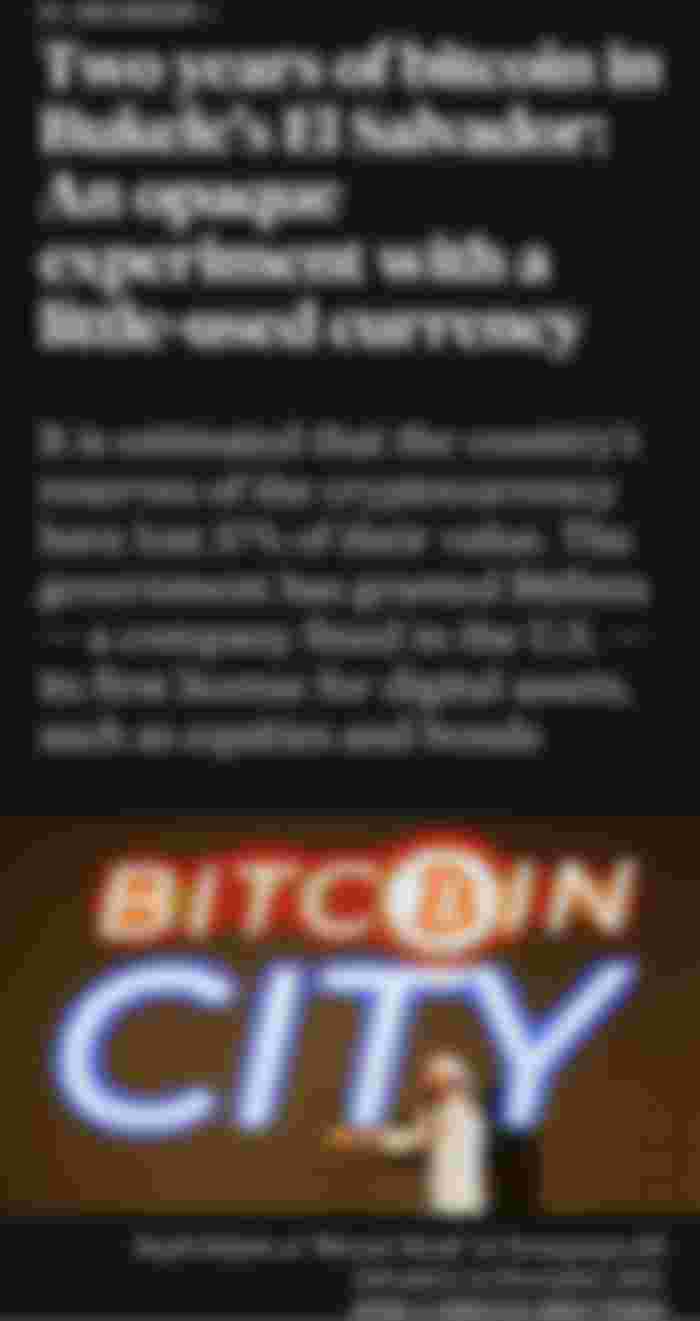Cryptocurrency Adoption: El Salvador's BTC Legal Tender vs. Global Voluntary BCH Adoption
Mon, Sep 4
Two years ago, a small country in South America with approximately 6 million inhabitants drew the world's attention when it announced for the first time ever that it had taken a giant step towards adopting BTC as legal tender in the country, becoming the second legal currency after the US dollar to be used in El Salvador's national territory.
This small country received significant external attention with this announcement, and there were expectations of an influx of tourists, journalists, and others due to the curiosity surrounding this decision.
The adoption of BTC was a bold move by the government, attracting investors to the financial market and establishing a complete infrastructure to facilitate the everyday use of BTC by the country's citizens. The government made a substantial investment, utilizing public funds to invest in BTC.
However, after two years, the value of BTC dropped significantly, given its inherent volatility, resulting in a negative balance in El Salvador's financial statement. It's worth noting that the BTC purchased is part of the general state budget.


The balance sheet becomes even more complex when we recall that the government of El Salvador also allocated a sum to "give away" $30 worth of BTC to every citizen who could verify their identity with the government's official wallet called Chivo. In this regard, the government opted to use the Lightning Network, a centralized BTC protocol, allowing them to have control over citizens' funds under certain justifiable conditions.
Despite the government's continued optimism about making BTC legal tender, there is still significant uncertainty and apprehension surrounding this decision. Many citizens remain skeptical about it, and it is unclear how the government plans to offset the losses incurred due to the devaluation of BTC.
What is known is that the majority of El Salvador's people (working abroad) continue to use, for example, BTC to send remittances to their loved ones in the country and they grab dollars after swapping out using the so louder nacional official BTC lightning network wallet Chivo. But, nothing more than that!

Chivo ATM machines often face issues, and there is a lot of bureaucracy involved in learning how to use them, along with other technological complications. For instance, there have been alarming reports that the initial $30 worth of BTC allocated to eligible citizens by the government was hacked and all the funds were stolen. President Nayib Bukele's life is far from easy, as the opposition is certainly using every means to tarnish his potential candidacy for re-election.
Furthermore, there have been protests due to the adoption of BTC, and the International Monetary Fund is not pleased with the president's stance on digital currency, as evident from the recent denial of a funding request with instructions for him to reconsider his position on BTC adoption.
To some, the decision to embrace BTC was courageous, but it also raises questions about hidden agendas behind this idea, one that is being marketed to both the international community and the citizens.
In reality, despite owning BTC, the people of El Salvador do not use it as a currency but rather exchange it for dollars at Chivo machines to make payments for goods, services, or investments within the national territory.
In summary, the adoption of BTC in El Salvador faces social challenges, inadequate preparation for financial inclusion of citizens, and a lack of transparency in the government's use of the national treasury in BTC. No one knows for sure how the government is addressing the currency's price volatility. These concerns cast a shadow over the initiative, and the population of El Salvador is bearing the consequences.
So far, the adoption of BTC appears to be more of a government investment strategy than a positive change for the people. Chivo ATMs are a central point of difficulty, and public education about this innovation is crucial before any successful implementation can occur. To date, the adoption of BTC in El Salvador has not yielded positive results.


[Read more about El Salvador remittances Here.]
Bitcoin Cash Global Adoption as Means Of Payment
There is a significant difference between governmental adoption of a currency as legal tender and voluntary adoption. In the former case, adoption is decided by the government executives after analyzing various factors and deeming its adoption advantageous.
In the latter case, people take their own initiative and choose a means of payment that truly works for them, keeping their money under their complete control. This means that individuals have the power to use their value without intermediaries and make purchases when and how they desire.
In my previous articles, I had the privilege of introducing various parts of the globe, such as Nigeria, Australia, Taiwan, Venezuela, Argentina and St. Kitts and Nevis, which are in an advanced stage of voluntary adoption of Bitcoin Cash as a means of payment for products or services. However, anyone who thinks that these locations are the only ones adopting Bitcoin Cash would be mistaken.
Today, I will highlight regions like Dubai in the United Arab Emirates and Mumbai in India, which are also making significant strides in adopting Bitcoin Cash as a means of payment. These destinations have substantial support from entrepreneurs who accept the currency in their ventures, recognizing the considerable advantages that Bitcoin Cash offers for their businesses.
In Dubai and Mumbai, for instance, people can enjoy breathtaking views, have fun, and ultimately pay using Bitcoin Cash at the "Epitome Night Club & Vegetarian," which has branches in both locations.




The presence of Bitcoin Cash in the Arabian lands of Dubai is not new, and in 2019, the region hosted its first meetup, where several individuals had the privilege of gathering to discuss Bitcoin Cash-related matters. It is believed that these gatherings slowed down, as was the case worldwide, due to the COVID-19 pandemic. However, in 2022, another successful meetup took place.
Masala Mantra is another establishment in Dubai where consumers can enjoy various services and pay using Bitcoin Cash in a comfortable and harmonious environment, providing both entertainment and financial freedom. After all, customers can make payments through a decentralized means without any third-party control at any time of the day. "Perfetto Pizzeria - Al Majara" is also a place where customers can have products paid for with Bitcoin Cash.
There are more than 16 locations in Dubai that accept payments for products and services using Bitcoin Cash. So, if you ever find yourself there, take a look and come share your experience with us. In India, there are also several locations that accept Bitcoin Cash as a means of payment, such as "Kinocottage," where customers can have their needs met by paying with Bitcoin Cash. Therefore, there are many places worldwide where the voluntary use of Bitcoin Cash is gaining traction.


Conclusion: True Adoption vs. Enforced Adoption
In today's article, we can observe two types of adoption. One is the attempt to adopt BTC in El Salvador, involving the use of digital means like the centralized Chivo wallet. This poses a challenge to the decentralized crypto ecosystem, as users can have their BTC frozen for reasons beyond their control, resulting in disorganized adoption by the government of Nayib Bukele.
On the other hand, we have the voluntary adoption of Bitcoin Cash on a global scale, as seen in Nigeria, Australia, Taiwan, Venezuela, Argentina and St. Kitts and Nevis also Dubai and India. Ordinary people and entrepreneurs are gradually bolstering the Bitcoin Cash economy organically and globally.
There is a misconception or wrong perception that popular and highly talked-about coins are the ones being adopted in commerce, but as we can see, that is not always the case. Bitcoin Cash, due to its peer-to-peer nature, is experiencing greater and faster adoption as it is embraced voluntarily.
I will conclude the article with a thought-provoking question: based on the facts presented in this article, which currency has a greater presence of peer-to-peer adoption and is currently serving people's aspirations better, BTC or BCH? I leave the answer to your discretion.
In addition to accepting tips on read.cash, I am accepting also here - https://tipb.ch/alberdioni8406 or scan the QR below:













nice article